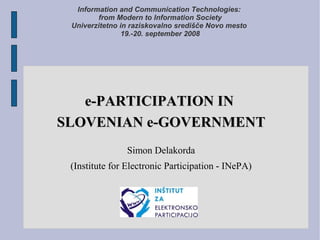Eparticipation In Slovenian E Government Delakorda
- 1. Information and Communication Technologies: from Modern to Information Society Univerzitetno in raziskovalno sredi┼Ī─Źe Novo mesto 19.-20. september 2008 e-PARTICIPATION IN SLOVENIAN e-GOVERNMENT Simon Delakorda (Institute for Electronic Participation - INePA)
- 5. Explanation Hypotheses Slovene e-government state of the art in the area of e-Participation / e-Democracy is a result of: ’ü¼ Implementation deficit ’ü¼ Development deficit
- 6. Methodology ’ü¼ Slovene government ministries web sites analysis (e-democracy tools typology; Trechsel, 2003) ’ü¼ Specific case studies analysis ’ü¼ E-government policy documents analysis (typology of e-democracy; Hagen, 1996) ’ü¼ Informal correspondence with government officials
- 7. Results I. - Implementation deficit ’ü¼ Earlier e-government strategies favoured electronic democratization concept (strengthening representative democracy) ’ü¼ E-government strategy 2006: Republic of Slovenia among 10 most developed e-democracies in the world ’ü¼ Conceptual shift towards participatory and direct democracy (e-pools, e-consultations, e- referendum etc.) ’ü¼ e-Democracy neglected by implementation plans
- 8. Results II. - Development deficit ’ü¼ all government ministries provided public information e-access ’ü¼ 8 ministries out of fifteen offered an e-mail address for sending comments on draft legislation ’ü¼ Little success with moderated on-line forums ’ü¼ Web 2.0 applications rarely available ’ü¼ E-Democracy web 1.0 portal not yet finalized
- 11. Interpretation Implementation and development deficit of e- Participation are results of a technocratic understanding of political democracy and citizenship: ’ü¼ e-Participation as technological issue ’ü¼ e-Participation as legal issue ’ü¼ Top down controlled e-participation in order to secure objective and rational support for political elites interest
- 12. Possible solutions ’ü¼ Adoption of Government Law on public participation and co-decision (e-participation regulation): ŌłÆ Political citizens are not e-government consumers ŌłÆ Political freedom should mean that citizens have the democratic right and instruments to reject government and political elites decisions without being sanctioned ’ü¼ Integration of knowledge and resources between public administration and civil society ’ü¼ Technology reorientation towards web 2.0 for strengthening active citizenship communities ’ü¼ Electronic strong democracy (Grossman, 1995)
- 13. THANK YOU! simon.delakorda@inepa.si Institute for Electronic Participation (INePA) Pov┼Īetova ulica 37 1000 Ljubljana, Slovenia Tel.:+386 41 365 529 http://www.inepa.si













